Atlas
House: Corsets(?), Shoes
and Residential
Britten and Bannister
Limited
90 Woodbridge Road.
(Listed as this number in several sources, although in 2016 the Horse
& Groom next door, to the left, is numbered 104.)
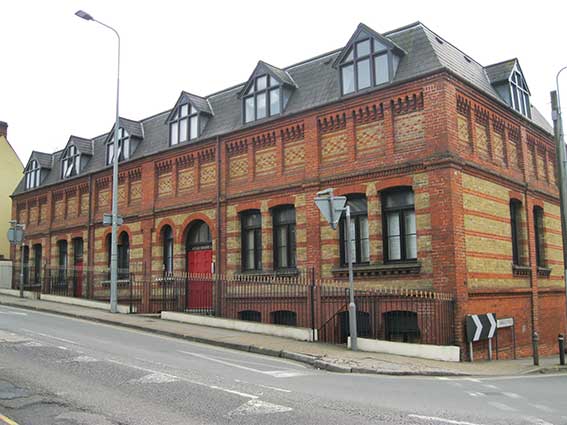 2017 images
2017 images
Although it bears little lettering, this handsome
building is
worthy of inclusion here from a local history point of view alone. The
road surface and crumbling of kerb and pavement are testament to the
heavy traffic which rumbles round this tight corner from Woodbridge
Road to Argyle Street.
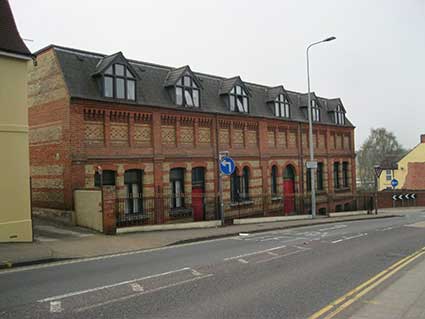
Above: the edge of the former Horse &
Groom public house is at the far left, with the former A.E. Blasby timber yard at the far right,
across Argyle Street.
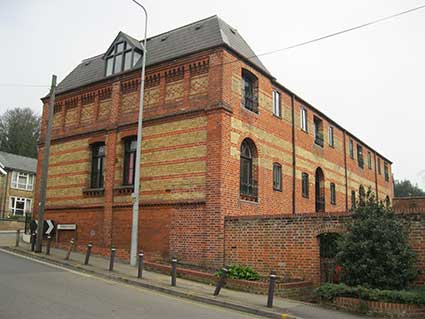
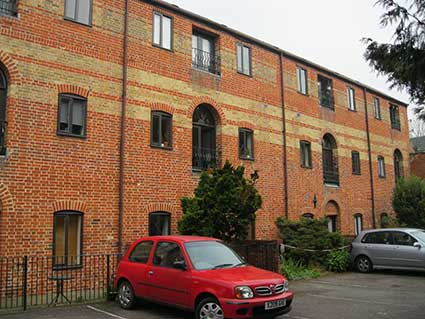
Above: the west and south elevations of the building – those
steel bollards are clearly needed to protect pedestrians from heavy
vehicles rushing up from the town. Although the south-facing is the
more 'workaday' aspect, the rear still bears
the cream and red brick banding, with modern windows cut through for
the apartments.
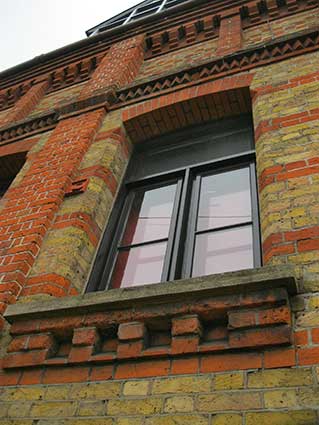
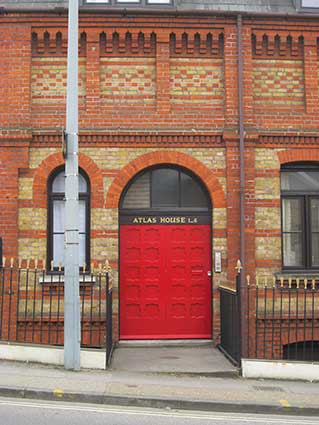
Above: the decorative brickwork on the west aspect and the main doorway
on the Woodbridge Road elevation.
What was it before conversion?
Barry Girling writes (26.3.2017):
'Hi Borin, I was hoping to have a small remnant for your site but,
alas, it has not worked out. Apologies if you are aware, but a friend
has recently informed me that Ipswich used to have a shoe manufactory
and a very high-class one at that. They possessed a royal warrant, made
shoes for ballerinas and famous film stars. The brand name was Miss
Rayne London and Ipswich. I had no previous knowledge of this...
Britten and Bannister was the local company which was located in the
rather handsome building at the corner of Argyle Street and Woodbridge
Road since converted into flats. It now bears the name Atlas House but
I do not know if this was the original name. They used to have a large
sign "Miss Rayne Shoes"over the front door facing Woodbridge Road.
Sadly, there does not seem to be any clue left as to the former use.
What a small world; the manager was a Mr Cross and my wife's late aunt
and uncle met there many years ago! Whether this is of any use to
you
I do not know, but thought it worthwhile to pass on. Best, Barry
Girling, Stutton.' (Thanks
to Barry for starting us off on this page.)
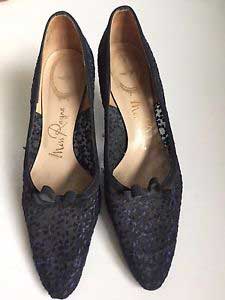
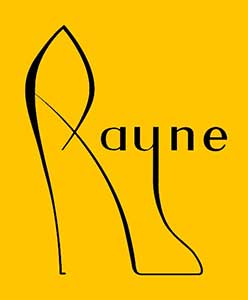 Miss Rayne
named shoes and brand logo
Miss Rayne
named shoes and brand logo
The three photographs below are courtesy the Ipswich Society Image
Archive (see Links).
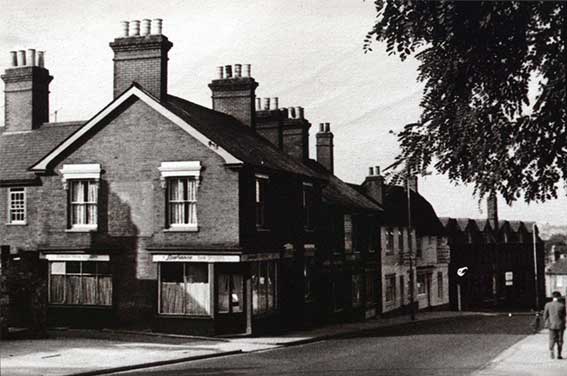 1960s image
courtesy Ipswich Society
1960s image
courtesy Ipswich Society
Seen from across the road from the St Helen's Primary School, the first
building in the 1960s view (above) is the hairdresser's with the corner
doorway, later lettered "Mary's" above
the shop windows. The shop signboard, before the "Mary's" lettering was
attached, runs round the
corner and seems to bear the sign-written: 'Balance: Hair Stylists'.
Although in
heavy shade, we can see the Horse &
Groom public house with two projecting signs: 'Tolly Cobbold Ales'
and a lettered pub sign (which would later be replaced by an illustred
sign). Beyond that is Britten
and Bannister's factory (now named Atlas House). The
light-coloured notice seems to be right above
the main doorway, so must be the 'Miss Rayne Shoes'
sign referred to by Barry. There is also a tall
chimney rising above the middle of the building, presumably because it
was a works. It was removed during conversion to residential use, as
seen below.
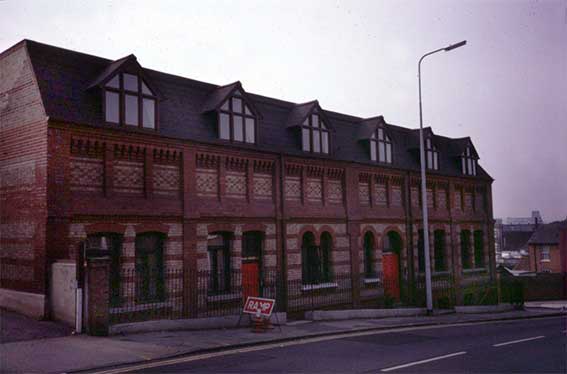 1970s image courtesy Ipswich Society
1970s image courtesy Ipswich Society
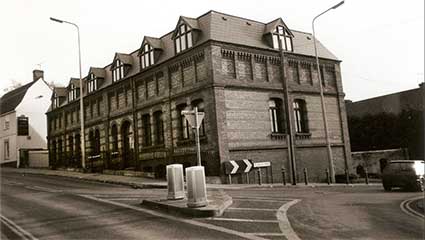 1990s image
by Tom Gondris;
courtesy Ipswich Society
1990s image
by Tom Gondris;
courtesy Ipswich Society
The 'former Atlas Works' is listed as dating from 1874, the
builder: R. Girling. ‘Former Warehouse, now flats’ (in a Conservation
Area).
A memory from Kindred Spirit
(see Links):
'M. Last of Shafto Road, Ipswich, added “My great aunt Hilda Stanmore,
lived on the corner of Little Wells Street, the front of her house was
on Wells Street. I was not very old at the time, but I remember a
square of concrete with a wash house and I presume a toilet, when
entering through the back door on the left was a stairs door, a coal
hole and a pantry. The facing door to front room with a Morrison air
raid shelter taking up most of the room, with just enough space to walk
to front door. A cooker range and sink completed the kitchen area. In
St Helens Street there was Minters Sweet Shop, you name it they sold
it, a fish and chip shop on corner of Wells Street and Newsteads the
bakers opposite. “We had the Olive Leaf public house and Elmey's paper
shop on the corner of Grimwade Street. When I set up home we bought
furniture from Gardiner's shop near the church. “Also near the church
was the International grocery store. My mother lived in St David's
Street, classed as the 'posher' area of the Potteries, they had three
bedrooms. “My grandfather was a
cobbler and the small room was used as a workshop, he was employed at
Britten and Bannister Limited boot and shoe makers in Woodbridge Road
with my mother.'
See our page on Palmerston
Road for a 1902 map detail including Atlas House and Wells Street.
'At the western end, the conservation area starts at the junction with
Argyle Street. To the corner is the brooding presence of an important
townscape building marking the start of the conservation area in
Woodbridge Road – Atlas Works, built in 1874, a former corset-stay
factory and warehouse before being converted to flats in 1984. The red
diapered brickwork within yellow stock brick panels and the corbelled
red brickwork above the ground floor windows give the building a
monumental appearance despite its relatively low scale and rising
topography. It has an eleven window range to Woodbridge Road and these
are contained mostly within swept arches with the exception of those
adjacent to the main front doors where semi-circular arches are
introduced and one pair of openings is supported on columns. Bands of
red brickwork run between the windows. A simple spiked railing
separates the building from a light-well to the semi-basements. A
series of six large dormers (with a further dormer to Argyle Street) in
slates covered with bitumen disguise an asymmetrical factory roof
behind.’
St
Helen’s Conservation Area, Appraisal & Management Plan, 2005(?)
Perhaps it was built as a corset factory – stay-making being a big
industry in Ipswich – then it became a shoe-making works?
Planning approval (with conditions) was granted by Ipswich Borough
Council on 22.1.1980: 'Change of use of second floor from warehousing
to manufacturing workrooms'.
Home
Please email any comments
and contributions by clicking here.
Search Ipswich
Historic Lettering
©2004
Copyright
throughout the Ipswich
Historic Lettering site: Borin Van Loon
No reproduction of text or images without express written permission
 2017 images
2017 images





 Miss Rayne
named shoes and brand logo
Miss Rayne
named shoes and brand logo 1960s image
courtesy Ipswich Society
1960s image
courtesy Ipswich Society 1970s image courtesy Ipswich Society
1970s image courtesy Ipswich Society 1990s image
by Tom Gondris;
courtesy Ipswich Society
1990s image
by Tom Gondris;
courtesy Ipswich Society